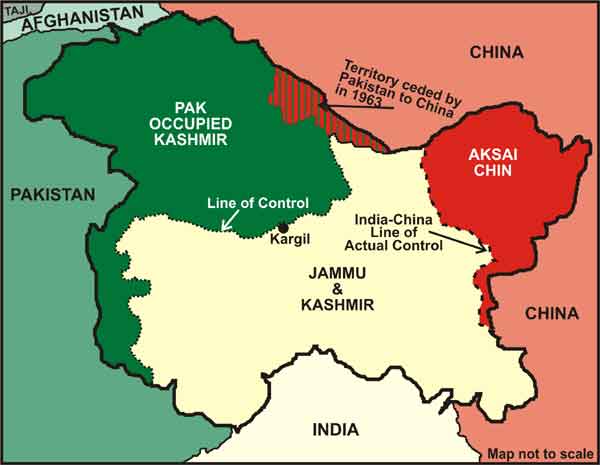I am very well aware that there are so many conflicts occurring that it is hard to keep track of them all. This new world era of geopolitical hegemony is tricky. Yet still, of all of the conflicts I am having a problem taking my eyes off of India and Pakistan. Tensions between New Delhi and Islamabad have been running high ever since India cracked down on protests in Indian-administered Kashmir in July.
 Over the past month there have been several events that make this situation both interesting and frighten. There was an assault that occurred in Kashmir on sept 18 in which four gunmen took an Indian army brigade headquarters in the Indian controlled town of Uri which resulted in the death of 18 soldiers. Although no one claimed responsibility for the attack, the government of Prime Minister Narendra Modi's accused Pakistan and even called it a terrorist state for supporting the individuals Modi believed were behind the attack. The Modi administration purports that the attack was carried out by members of Jaish-e-Mohammed (a group based in Pakistan that has the aim of forcing the withdrawal of troops in India-controlled Kashmir). More recently, an Indian army brigade headquarters near the de factor border with Pakistan was attacked which left 17 soldiers dead in the northern region of Kashmir.
Over the past month there have been several events that make this situation both interesting and frighten. There was an assault that occurred in Kashmir on sept 18 in which four gunmen took an Indian army brigade headquarters in the Indian controlled town of Uri which resulted in the death of 18 soldiers. Although no one claimed responsibility for the attack, the government of Prime Minister Narendra Modi's accused Pakistan and even called it a terrorist state for supporting the individuals Modi believed were behind the attack. The Modi administration purports that the attack was carried out by members of Jaish-e-Mohammed (a group based in Pakistan that has the aim of forcing the withdrawal of troops in India-controlled Kashmir). More recently, an Indian army brigade headquarters near the de factor border with Pakistan was attacked which left 17 soldiers dead in the northern region of Kashmir.
Then
on the 21st of October, seven Pakistani Rangers were killed and three others injured when the Border Security Force (BSF) of India retaliated shelled and
fired from across the International Border at locations near and around the
Kathua and Jammu districts of Kashmir. The only information that has been
proffered is that Islamabad has rejected all allegations made by New Delhi's in
an effort to take attention away from human rights violations in
Indian-controlled Kashmir, while Pakistan has asserted that the Indian Army is
just firing at citizens and military outpost without provocation.
Whatever
the case and whoever fired first, this is getting in dangerous territory. From
what I have read, there have been at least four wars between India and
Pakistan, if not more if I included other minor skirmishes. The first happened
in 1947. This was called by many as the First Indo-Pakistani War. Like most
wars it stated over some dumb shit – the belief that the royal leader of
Kashmir would pledge his nation’s allegiance to India. He had the choice to
join India or Pakistan or to remain independent. The problem was that he was a
Hindu and ruled a majority Muslim population and this was a no-no for Pakistan,
so they attacked and occupied parts of Kashmir and this was the first war. It took UN Security Council involvement for a
formal cease-fire to occur and on New year’s eve 1949,
India gained control of about two-third of Kashmir and Pakistan a third.
The second war occurred in 1965 after Pakistan's military joined with militants
from Jammu and Kashmir to start an insurgency against Indian rule in the
region. This resulted in India launching a full-scale military attack on what
was then West Pakistan. Although it only lasted for a week, the 1965
Indo-Pakistani War resulted in thousands of casualties and was considered by
some historians to have been the largest tank battle since World War II. The
war only ended after the Soviet Union and USA got involved to negotiate a truce between Islamabad and New Delhi. Believe it or not, the same thing
happened again in 1971 and 1991.
It seems that almost daily we are getting
information regarding either one side shooting or shelling the other side. Most
recently involved Pakistani officials say Indian troops have opened
fire across the Line of Control in the disputed region regularly and they continue
to respond with heavy fire as a consequence.
With all of the violence presently happening
in the world, especially in the region many call the Middle East, it is
extremely important that we keep an eye on this, for history has shown us the
region of Kashmir is a hotbed and its people crave independence away from India
at any cost. In addition, it doesn’t take much for Islamabad and New Delhi
to go to war with each other, and maybe even making use of the nuclear option.
There have already been four significant wars between the two nations over the
past 70 years, I just wonder if we may be seeing the start of the fifth.



































Thank you for sharing in this article, I can a lot and could also be a reference I hope to read the next your article update
ReplyDelete